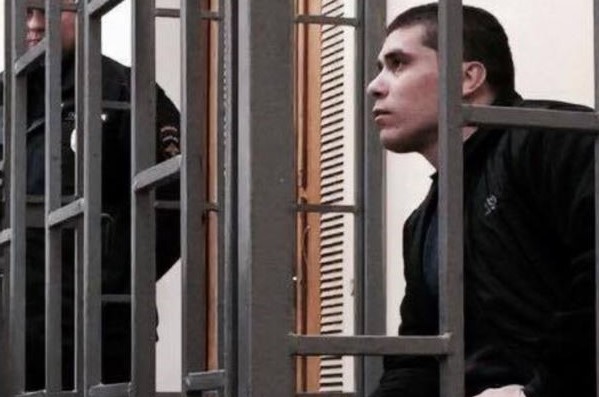• Topics / Human Rights Abuses in Russian-occupied Crimea
Second ‘confessed’ Ukrainian Crimea saboteur jailed on different charges

A court in Russian-occupied Crimea on August 10 sentenced Redvan Suleymanov to 1 year and 8 months imprisonment on a charge which differs radically from his widely televised ‘confession’ to involvement in a Ukrainian military ‘Crimea saboteur plot’. Natalya Skholnaya, ‘judge’ at the Zheleznodorozhny District Court, also ordered him to pay almost three and a half million roubles in unproven damages. This is despite compelling grounds for believing that, if not the charge itself, then the claimed damages were always aimed at hiding vast amounts of money siphoned off by corrupt officials. Redvan’s mother is not alone in viewing the proceedings as far more similar to a farce, than a court trial.
The young Crimean Tatar was among the Ukrainians who held out for over 20 days after Russia’s invasion in 2014, refusing to abandon the Ukrainian military unit which had been surrounded by Russian soldiers. His mother recalls that after the decision to evacuate the soldiers, Redvan sat at home for several days, listening in tears to the Ukrainian national anthem played at top volume. He moved to mainland Ukraine and had been working in the Zaporizhya oblast when the story that Russia’s FSB itself keeps changing began. Suleymanov was the first to be arrested on July 30, 2016, in occupied Crimea.
The FSB’s first story
On 10 August 2016, the FSB claimed that it had foiled terrorist acts planned by the Ukrainian Defence Ministry’s military intelligence. It asserted that there had been major incidents, with shelling from mainland Ukraine, during the nights from 6-7 and 7-8 August, with 2 Russians – an FSB officer and a soldier – killed. A very different interpretation (a drunken brawl) has been suggested for the one incident during the first night and there is nothing to back the claims about the second night and supposed shelling from Ukraine.
There was no proof, only four videoed ‘confessions’ from Yevhen Panov; Andriy Zakhtei; Suleymanov and Volodymyr Prysich.
Suleymanov’s ‘confession’ coincided with an ominous claim from an official in the occupation government that Ukraine was planning “new sabotage” under the guise of acts of resistance by Crimean Tatars.
‘Confession’
Suleymanov’s ‘confession’ was broadcast on August 12, 2016. On the video, he asserts that he was recruited by Ukrainian military intelligence in 2015 and given the pseudonym ‘Joseph’. He was ordered to gather information, and told to find himself a job at the airport or railway station to report on the movement of military technology. In July, he was also allegedly instructed
In July 2016, he had supposedly been instructed to go to Simferopol and find a place to plant bombs in the airport and bus station, with the criteria being: the possibility of hiding them and large number of people around.
He was also supposed to make a dummy model of an explosive device, place it somewhere and phone the police, remaining at the airport to study and photograph how the police behaved.
Suleymanov finally recounts how on July 30, 2016, he went to Simferopol Airport where he phoned the Defence Ministry contact and told him that he’d planted the item successfully. The contact told him to wait, and then create a “conference link” with the police. At this point, he says, he heard something that shocked him “that I’m Akhmet Karimov, and that today my brothers and I are moving from a small to a big Jihad, and that at 12.00 on the dot, we will blow up the airport, then other places.
The charges
It is unclear whether the FSB was really planning to push this implausible story, but gave up after prominent rights lawyer Emil Kurbedinov took up Suleymanov’s defence, or if the FSB only needed the initial publicity and unsubstantiated claims about a ‘sabotage plot’.
Suleymanov has not retracted his partial admission to the false alarm charge, though consistently rejected the extraordinary claim that this caused 4 million roubles in damages. Following Kurbedinov’s hard questioning in court, the prosecution also found that the claims from three of the five alleged victims regarding disinformation, cannot be taken seriously.
Shkolnaya refused to remove the three million rouble damages claim from the Maritime Directorate and, tellingly, rejected Kurbedinov’s request to have a statement added to the material which highlights the serious grounds for believing that the said Maritime Directorate needed to hide massive losses. A year later, the Accounting Chamber of Crimea has identified serious irregularities which are likely to result in multiple criminal proceedings. It seems very likely that the entire story was always intended as a smokescreen.
Torture
Suleymanov was held without access to a proper lawyer for the first 10 hours, with this being when the ‘confession’ was extracted. Kurbedinov reports that his client is ‘silent’ but that if you look at the protocols when he was taken again and again for ‘questioning’, Suleymanov became increasingly more willing to ‘cooperate’.
All three other men have said that their confessions were obtained through torture, and it is clearly incomprehensible why Suleymanov should have confessed to a story that corresponded to the FSB ‘Ukrainian saboteur’ plot, without having any basis in truth.
.





